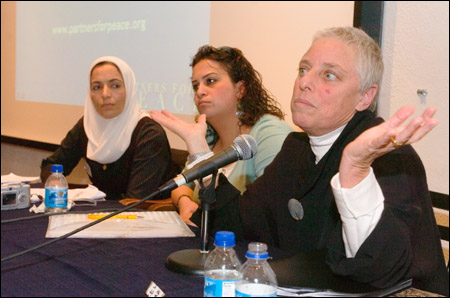‘Jerusalem women,’ touring as Partners for Peace, fault Israeli policies
“I am coming here to say, help us. America is involved in this conflict, and is feeding it. Wherever you stand, stand for justice.”
That was the contention and the directive of Ghada Ageel, a third-generation Palestinian Muslim refugee, at the Harvard Divinity School Friday (Oct. 13).
She was there as part of “Jerusalem Women Speak,” a three-woman panel on a tour of New England sponsored by the organization Partners for Peace, a Washington, D.C.-based nonprofit group. The Pluralism Project sponsored the University event.

Ageel and her fellow-panelists – Shireen Khamis, a Palestinan Christian from Beit Jala, near Bethlehem, and Rela Mazali, a Jewish Israeli – are touring to speak from their own experience of the Israeli-Palestinian conflict. All three women described themselves at one point or another in the session as relatively “privileged.” But they said they saw American news organizations and the U.S. government as biased and unreceptive to reports of Palestinian suffering. This unanimity of views was typical of the session.
Ageel said that her family had been expelled from their homes in 1948 when the state of Israel was established. In May of that year, Israel was recognized as an independent state by the United Nations, an event that precipitated the invasion of the country by its Arab neighbors.
In 1995, during the hopeful moment of the Oslo peace process, Ageel went to Israel to study Hebrew and, for the first time, to meet Israelis and connect with them as human beings. “We could agree on many things,” she said. But it was an eye-opener, she said, to see how different the standard of living for Israel was from that of the refugee camp where she had grown up.
Khamis, who said she was part of a Christian community that has been present in Israel since the very beginning of the Christian era, showed pictures of her family’s olive trees, marked for destruction by red slashes of paint, and then uprooted by the Israelis, she said, to make way for a new security wall “to protect settlers from all over the world.”
Mazali suggested that the stresses of the Palestinian-Israeli conflict were “brutalizing” Israeli society as well as Arabs.
Mazali also shared her experience of trying, and failing, to get into a mainstream Israeli newspaper a report of what she saw as a significant shift in Israeli tactics in what all three panelists called the “occupied territories”: Instead of bulldozing the homes of militants – suspected or convicted, she said, the security forces had started destroying them with artillery shells.
She worked her contacts and pulled her strings, but the paper was not interested. It was considered a nonevent, Mazali said. In the paper’s view, “It was a piece of reality that’s been ‘disappeared’ from the reality that is passed on to you and to me, too.”
Partners for Peace says that it works to bring to American audiences and media “the voices that often go unheard” as part of its advocacy for a “just and lasting settlement of the Israeli-Palestinian conflict.” This year’s tour, running from Oct. 7 to 24, is the 12th the group has sponsored. The three women hadn’t met until they came to the United States and are unlikely to be able to meet again once they return to the Middle East.
It was not exactly a feel-good session.
Mark Braverman, a member of the Partners for Peace board, who introduced the panel, observed, “Confronting this situation creates a crisis of faith. How does one maintain one’s faith in the face of evil?”
Mazali thanked her audience simply for being present – “It’s not easy to hear what we have to say.”
It was also not a session that purported to give both the pros and the cons of the “occupation”; rather, it presented a case against Israeli activities from the perspective of three different communities. Some dissenting voices were raised, however.
An Israeli in the audience, who had spent three years on active duty in the Israeli Defense Forces and another nine years as a reservist, challenged the view of Israeli soldiers at the checkpoints as “inhumane.”
Questions from the floor also included one from a Roman Catholic activist who criticized the three for not presenting a fuller picture of Israeli fears and concerns.




